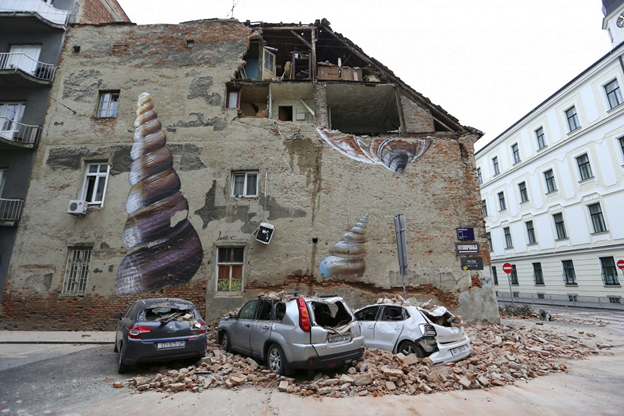Creative Europe Programme
of the European Union
Communities respond to natural disasters with immediate actions of solidarity and mutual support. The Zagreb Summerlab artistically explores ideas and practices of care and solidarity around the 2020 Zagreb and Petrinja Earthquakes.
Zagreb, 29 june – 3 july 2021
 Zagreb earthquake 2020 - Photo by: Domino
Zagreb earthquake 2020 - Photo by: DominoThe ACT Summer Labs are events intended for exchange and development of artistic practices.
The four editions of the ACT Summer Lab are held subsequently in Zagreb, Ljubljana, Skopje and Riga. Every Summer Lab is curated by the local organising partner, making sure it is a place of interaction with the local communities.
The ACT partners invite artists to work together in this process of artistic immersion and exploration.
The first Summer Lab is organised by Domino, from Zagreb, at the time of the Perforations Festival 2021, and it will be structured around the theme of Natural Disasters.
Earthquakes in Croatia
In 2020, apart from being afflicted by the pandemic like the rest of the world, Croatia was hit by two devastating earthquakes. In March, in the midst of the first lockdown, Zagreb was the first to get hit by a 5.3 magnitude earthquake that badly damaged the old city centre and tragically took the life of a child. Only a few days before the end of the widely disliked year of 2020, a second, stronger earthquake hit the town of Petrinja, 50 km from Zagreb, critically demolishing the neglected town and surrounding villages, killing 7 people and leaving thousands without homes. The 6.4 magnitude earthquake shocked the nation and so many people rushed to aid the town and surrounding villages that they blocked the roads with their cars and good intentions.
Civic response
In both cases, the government response was many steps behind the immediate citizen reaction and empathetic call to action. As we collected our thoughts, feelings and collective impressions, we noticed a certain bright side to this misfortune. The pure force of the solidarity, understanding and compassion these circumstances ignited was incredible – people put their efforts into supporting each other and tried to work through their own shock by helping those in need. People volunteered to provide the unfortunate with temporary homes, food and shelter and collected immense amounts of donations. Others were on location for weeks, manually helping in any way they could. Experienced alpinists climbed roofs to remove debris and collapsed chimneys, psychologists volunteered on support helplines, professional chefs cooked meals for everyone, veterinarians did checkups on farm animals, activists cared for runaway cats and dogs etc. A lot of volunteers were active for months, organized and coordinated to some extent, working together to the best of their ability, citizen to citizen, neighbour to neighbour.
Explore solidarity
Although earthquakes may not be directly linked to climate change, these are universal responses to most natural disasters that could arise because of climate change. We see this as the silver lining of such unfortunate events. Although there are always those who try to profit in situations of chaos, this should not discourage us from seeing the good that it inspires in people – especially in the midst of a global pandemic. That’s why we see this as an opportunity to explore this sense of community – the purity of this immediate reaction and empathy ingrained in most of us, that makes us capable of working together, offering a helping hand, understanding and sharing what we have. Humanitarian aid was not without its problems and obstacles – for example, there is still no clear way of disposing or recycling inadmissible material donations that keep piling up.
This is why it is important that artists and activists deal with these issues and imagine alternative scenarios and innovative solutions for these complicated situations in order to make these examples of good, charitable and well-meant practices more sustainable for the future. We want to artistically explore these ideas and practices to remind us that we are all together on this planet and that we are responsible for ourselves, each other and the nature around us.
Programme Summerlab
Domino will organize a programme of practical workshops, lectures, fieldtrips and tours. Included will be the seismology service, the town of Petrinja with the community directly involved, an artists led tour of the Zagreb earthquake damage.
Artist participating
Ivana Dragšić (Lokomotiva – North Macedonia), Katarina Kožul (Domino – Croatia), Krišjānis Elviks (NTIL – Latvia), Lea Kukovičič (Bunker – Slovenia), Nikolas Lestaeghe (Kaaitheater – Belgium), Sara Vieira Marques (Culturgest – Portugal)
ACT Observants: Ana Džokić, Marc Neelen
“Keywords: art in ruins, public policies of restoration/renovation, rebuilding, public safety, humanitarian aid, compassion and solidarity in the community, collective trauma and healing through art”This is a Domino Project